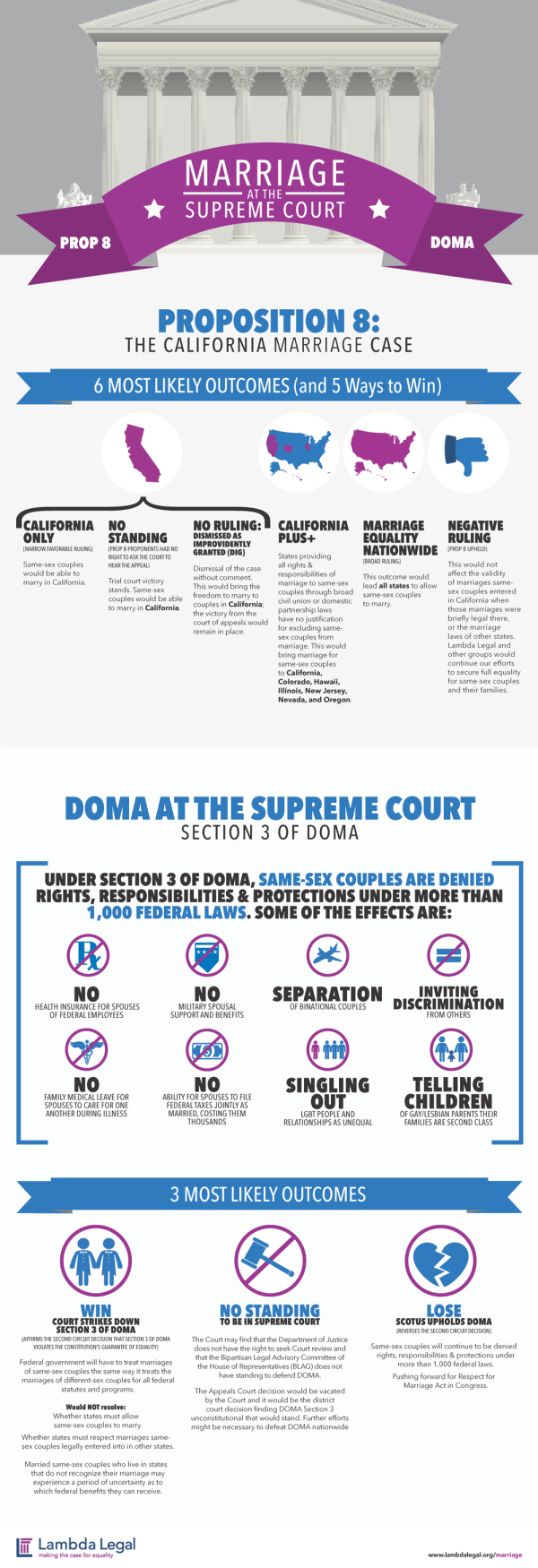Today, the Supreme Court ruled to strike down DOMA and declared it unconstitutional as per the Fifth Amendment. It has been ruled that the petitioners in Prop 8 did not have standing, and so the appeal is dismissed. From the decision on DOMA:
The federal statute is invalid, for no legitimate purpose overcomes the purpose and effect to disparage and injure those whom the State, by its marriage laws, sought to protect in personhood and dignity. By seeking to displace this protection and treating those persons as living in marriages less respected than others.
It’s the culmination of months of waiting, and before that, years of struggle and activism. The Supreme Court heard arguments on two different issues: the Defense of Marriage amendment that defined marriage as being between one man and one woman on the federal level, and California’s Proposition 8, which sought to specifically outlaw same-sex marriage.
Given that there were two pieces of legislation under consideration, with differing purviews (a ruling on Prop 8 could be confined to California; DOMA is an amendment with national implications), there were complicated combinations of possible rulings and possible outcomes. The New York Times has a helpful flowchart which explains them, or you could look at these infographics from GLAAD.

The ruling on DOMA does not legislate same-sex marriage, but it does mean that in states where same-sex marriage is already legal, the federal government will recognize those marriages in the same way that they recognize different-sex marriages. This decision has no bearing on whether same-sex marriage will be legal in individual states. The opinion was written by Justice Kennedy, with the supporting four votes coming from Ginsburg, Breyer, Sotomayor, and Kagan. Justice Scalia has dissented, along with justices Alito, Roberts and Thomas.
The no standing ruling in Prop 8 means that there will be no national impact on same-sex marriage rights because of this case, but that same-sex marriage should become legal in California. Essentially, the Supreme Court is saying that the people who appealed the striking down of Prop 8 don’t have legal legitimacy to make an appeal, and so the court isn’t really considering the case. Over at SCOTUSblog, there’s a discussion of what the next step for Prop 8 might be. Here’s the SCOTUS liveblog’s take on what just happened with Prop 8, according to Amy Howe:
After the two same-sex couples filed their challenge to Proposition 8 in federal court in California, the California government officials who would normally have defended the law in court, declined to do so. So the proponents of Proposition 8 stepped in to defend the law, and the California Supreme Court (in response to a request by the lower court) ruled that they could do so under state law. But today the Supreme Court held that the proponents do not have the legal right to defend the law in court. As a result, it held, the decision by the U.S. Court of Appeals for the Ninth Circuit, the intermediate appellate court, has no legal force, and it sent the case back to that court with instructions for it to dismiss the case.







